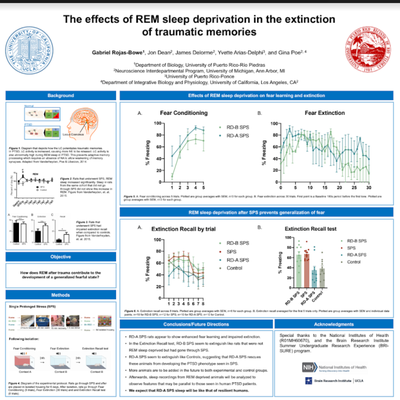
Gabriel Rojas-Bowe
Home Institution: University of Puerto Rico Rio Piedras
UCLA Mentor: Dr. Gina Poe
Program: BRI-SURE
Abstract:
One of the key features of sleep is REM, a phase where the brain consolidates memories. While necessary for learning, REM can become maladaptive when coupled with stress, such as that of undergoing a traumatic experience. Previous work has shown that after trauma, rats show increased levels of REM. These changes in REM correlated with their freezing behavior in a later fear extinction recall test. Rats that froze more had bigger increases in REM following trauma while rats with little changes in REM froze less. How REM after trauma contributes to the development of this generalized fearful state remains unknown. To test this, we REM deprived (RD) animals before and after a traumatic experience using single prolonged stress (SPS) as a model to induce a PTSD-like phenotype in rats. Our hypothesis was that if we RD before SPS, REM would increase going to sleep after the trauma because of a sleep rebound effect, inducing PTSD. Conversely, if we RD after, we would counter the increase in REM and prevent the development of PTSD. Rats would then go through fear conditioning, fear extinction, and extinction recall tests in order to assess the effect of RD in the development of susceptibility/resilience to a future stressor. Currently, we are analyzing behavioural data for all phases of the experiment, as well as confirming with sleep recordings whether RD actually occurred in our rats.

